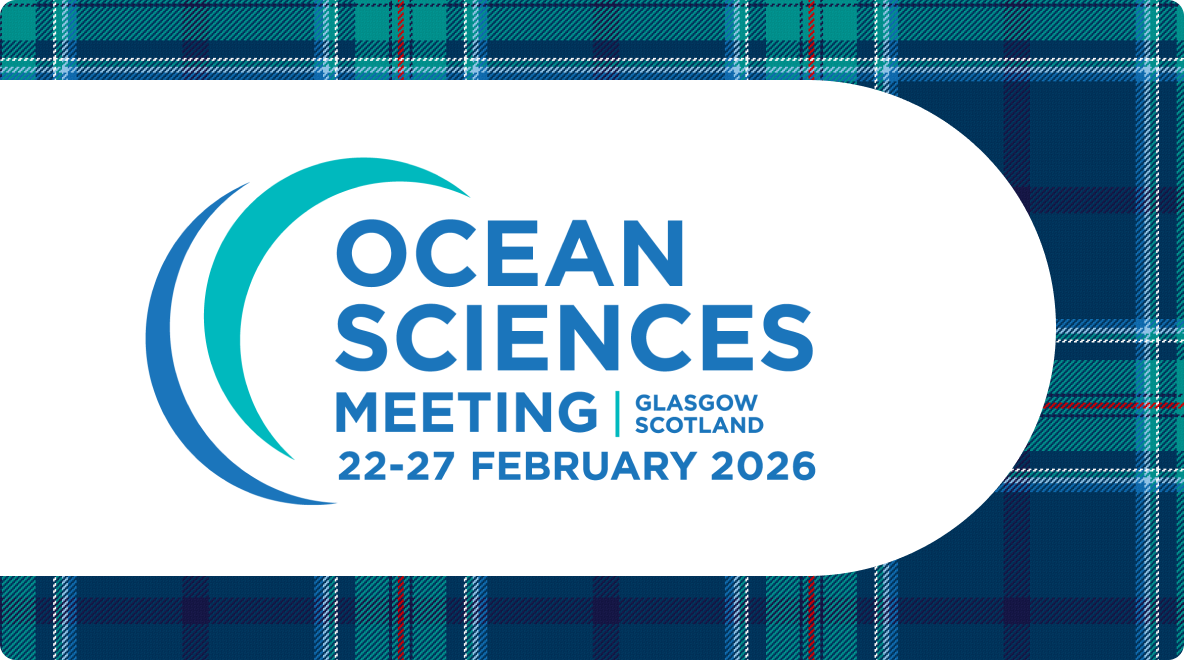SOOS & Southern Ocean-related sessions at OSM 26, Glasgow

The Ocean Sciences Meeting (OSM) is one of the largest international gatherings of oceanographers and marine scientists, held every two years and co-sponsored by AGU, ASLO, and TOS.
The 2026 edition will take place 22–27 February in Glasgow, Scotland, bringing together researchers from around the world to share the latest developments in ocean science, technology, and policy.
Below is a list of sessions and activities at OSM26 that involve or are led by the Southern Ocean Observing System (SOOS) community. SOOS will also be strongly represented at the meeting including by SOOS Data Officer, Michaela Miller.
SOOS Convened/Co-Convened Sessions and Town Halls:
SOFLUX & Air-Sea Interaction Sessions
AI24A: Polar air-sea interactions in a warming climate | Poster-
- Conveners: Co-convened by SOFLUX Leadership (Marcel du Plessis, Channing Prend, Sarah Nicholson)
- Schedule: Tuesday 24th Feburary, 16:00-18:00, Hall 4/Poster Hall
- Topic Area: Air-Sea Interactions
- Link: https://agu.confex.com/agu/osm26/meetingapp.cgi/Session/259704
- Summary:
Air-sea fluxes of heat, momentum, carbon, and other gases in the polar regions play a key role in global climate. For example, the decline in sea ice reduces surface albedo and modifies atmospheric circulation, influencing surface temperatures, precipitation, and weather both locally and globally. These changes are opening new Arctic shipping routes, such as the Northwest Passage and the Northern Sea Route, significantly shortening travel distances between Asia to Europe and Asia to eastern North America. Meanwhile, in the Southern Ocean, growing evidence suggests that synoptic- and fine- scale air-sea interactions also influence the larger scale mixed-layer budgets of heat, carbon and other tracers. However, the mechanisms of multi-scale interaction and energy exchange remain poorly understood and quantified.Within this frame, this session seeks to cover the full spectrum of air-sea fluxes and feedbacks, from microscale turbulence to large-scale climate mode, including wave-ice interactions and decadal variability. We welcome contributions focused on the Arctic and/or Antarctic, as well as studies utilizing in situ observations, satellite data, and numerical models. Understanding polar air-sea interactions in a warming climate is essential for advancing climate science and responding to emerging economic opportunities.
AI14A and AI23A: Advances in Air-Sea Interaction Observations and Remote Sensing: Autonomous Platforms, Multiscale Processes, and Cross-Disciplinary Linkages | Oral and Poster
-
- Convener: Co-convened by Ronald Buss de Souza (SOFLUX Leadership Team Member)
- Schedule: Monday 23rd February, 16:00-18:00, Hall 4/Poster Hall (Poster) and Tuesday 24th February, 14:00-15:30, Boisdale (Oral)
- Topic Area: Air-Sea Interactions
- Link: https://aghttps://agu.confex.com/agu/osm26/meetingapp.cgi/Session/259701 (Poster) and https://agu.confex.com/agu/osm26/meetingapp.cgi/Session/274777 (Oral)
- Summary:
The ocean and atmosphere interact through fluxes of heat, mass, momentum, and gases, driving variability across scales, yet traditional observations are inherently limited in spatial coverage. Recent advances in autonomous platforms such as the Uncrewed Marine Systems and Aerial Vehicles permit observations of air-sea interactions in challenging environments, from tropical cyclones to marginal ice zones, while next-generation remote sensing (e.g., PACE, SWOT, GOES) coupled with novel methodologies (AI, data fusion, submesoscale-resolving models) provides synoptic views of upper-ocean and lower-atmosphere dynamics, gas exchange, and turbulent mixing. This session seeks studies leveraging these tools to explore physical and biogeochemical processes, including model assimilation, forecasting, and mechanistic understanding of ocean-atmosphere coupling, with particular interest in cross-disciplinary linkages—such as how submesoscale physics mediate nutrient supply or how extreme events alter marine ecosystems. We also encourage contributions on integrating autonomous systems with remote sensing, hyperspectral data exploitation, and AI-driven retrieval algorithms to bridge gaps in quantifying air-sea fluxes (heat, CO₂) and their cascading impacts on weather systems, marine productivity, carbon export, and habitat shifts. By uniting in situ and satellite perspectives, the session aims to foster dialogue on emerging technologies that address multiscale challenges in air-sea interaction research, from microscale turbulence to basin-wide feedbacks.
Carbon Cycle & Biogeochemistry
HE21B: The Southern Ocean Carbon Sink: processes, observations, and change | Oral and Poster-
- Conveners: Cathy Wimart-Rousseau, Meredith Meyer, Thomas Bell, Pablo Trucco Pignata (SOOS SO-OA Hub leadership), Louise Delaigue
- Schedule: Tuesday 24th February, 8:30-10:00, Forth (Oral) and Tuesday 24th February, 16:00-18:00, Hall 4/Poster Hall (Poster)
- Topic Area: Air-sea carbon flux, autonomous & ship-based observations, biogeochemical variability
- Link: https://agu.confex.com/agu/osm26/meetingapp.cgi/Session/273289 (Oral) and https://agu.confex.com/agu/osm26/meetingapp.cgi/Session/259380 (Poster)
- Summary:
This session seeks studies addressing the drivers of change in polar oceans, including sea ice loss, circulation shifts, and biogeochemical processes. It welcomes observational, remote sensing, and modelling work from both hemispheres. Special emphasis is on new tech, data gaps, and initiatives like MOSAiC and Polar Argo.
High Latitude Environments
HE11A: Improving understanding of processes in the high-latitude and sea-ice covered oceans: Ongoing and future observation and modelling efforts | Oral and Poster-
- Conveners: Primary chair Alexander Brearley (WSDML Leadership), Co-convened: Carolina Dufour (SORP Co-chair), Caroline Holmes, Laura Crews, Nicolas Kolodziejczyk
- Schedule: Monday 23 Feburary, 8:30-10:00, Hall 3/ The Sound (Oral I), Monday 23 February, 16:00-18:00, Hall 4/Poster Hall (Poster I), Tuesday 24th February, 8:30-10:00, Hall 3/Blue Horizon (Oral II), Tuesday 24th February, 8:30-10:00, 14:00-15:30, Hall 3/Blue Horizon (Oral III), Tuesday 24th February, 16:00-18:00, Hall 4 Poster Hall (Poster II)
- Topic Area: High Latitude Environments
- Link: https://agu.confex.com/agu/osm26/meetingapp.cgi/Session/273353 (Oral I), https://agu.confex.com/agu/osm26/meetingapp.cgi/Session/259451 (Poster I), https://agu.confex.com/agu/osm26/meetingapp.cgi/Session/273357 (Oral II), https://agu.confex.com/agu/osm26/meetingapp.cgi/Session/273361 (Oral III), https://agu.confex.com/agu/osm26/meetingapp.cgi/Session/273369 (Poster II)
- Summary:
The polar oceans are subject to accelerating change, notably through rapid loss of sea ice, intense warming, changing ocean circulation, and an intensifying hydrological cycle. These changes affect many climatically-relevant processes, including atmosphere-ocean heat/CO2 fluxes, upper-ocean mixing, water mass formation (including dense water production), sea level rise and upper-ocean biological productivity. Nevertheless, observing and modelling the polar oceans remains difficult, particularly in the sea ice-covered and marginal ice zones, where strong spatial heterogeneity and lateral property gradients are found. This limits the evaluation and improvement of predictive models.This session invites contributions from the in-situ observation, remote sensing and modelling communities of both the Antarctic and Arctic. Studies detailing novel methodology including underwater robotics and new satellite/airborne technologies are especially welcomed. Of particular interest are also studies that highlight the use of polar observing systems and those which identify observational gaps and assess ways to fill these gaps. Contributions related but not limited to MOSAiC, Antarctica InSync, the International Polar Year, and Polar Argo are encouraged. We also particularly welcome contributions from the sea ice community, and from diverse scientific fields such as physics, biogeochemistry, sea ice and climate predictability, and biology.
Technology & Observing Systems
OT34B: Emerging technologies to enhance Southern Ocean and Antarctic observations | Poster-
- Conveners: Andreas Marouchos (SOOS Polar Tech Task Team), Alyce Hancock (SOOS Executive Officer)
- Schedule: Wednesday 25th February, 16:00-18:00, Hall 4/Poster Hall
- Topic Area: Ocean Technologies
- Link: https://agu.confex.com/agu/osm26/meetingapp.cgi/Session/255285
- Summary:
The Southern Ocean is a critical component of the global climate system. It controls the uptake of human-generated heat and carbon into the ocean. We are currently observing critical changes and extreme events in the Southern Ocean including record low levels of sea-ice extent, high temperatures and dramatic shifts in penguin populations. Despite a significant growth in Southern Ocean observations over the last decade, observations of this remote and extreme environment are still sparse. This chronic lack of observations is constraining our understanding of the underlying processes of change, ability to predict potential future states and the flow of consequences for the Earth system. The application of new and emerging technology remains the key enabler in progressing observations in the Southern Ocean and Antarctic waters. In particular the use of autonomous platforms greatly enhances observations including under-ice measurements, observations during winter and data supporting air-sea fluxes. To meet SOOS’s mission of having a sustained, integrated observing system of the Southern Ocean, a full portfolio of polar technologies will be required. This session invites presentations on science enabled by new technologies as well as engineering and technical presentations on developments that could address challenges facing Southern Ocean and Antarctic research.
Open Science & Data
TH53E: Open Science and Data for Polar Research | Town Hall-
- Organised by the SOOS DMSC including Co-chairs Petra ten Hoopen (British Antarctic Survey), Antonio Novellino (EMODNET) and Michaela Miller (SOOS IPO)
- Schedule: Friday 27th February, 12:45-13:45, Lomond Auditorium
- Format: Town Hall
- Link: https://agu.confex.com/agu/osm26/meetingapp.cgi/Session/254185
- Summary:
This Town Hall will seek information from the polar research community on challenges that researchers experience with implementation of open science and discovery & reuse of polar data. We will primarily focus on observational data from marine platforms in the Arctic and Antarctic. Feedback gathered from the Town Hall conversations will shape expansion of a data portal for the Southern Ocean - SOOSmap (https://www.soosmap.aq/), which will be very briefly introduced to the audience during the session. We will encourage conversations that will provide also use cases for development priorities of a similar one-stop-shop data resource for the Arctic. We believe that responses from the experts gathered during a flagship conference such as OSM26 can be representative of current needs of the polar research community and would provide a valuable input into improving open access to polar data and beyond.
SOOS Presentations:
Southern Ocean Observing System for Sustained and Coordinated Observations in a Changing World | Poster-
- Presented by Andrew Meijers (SOOS EXCOM), Channing Prend (SOOS SOFLUX CWG), Denise Fernandez (SOOS Ross Sea RWG)
- Schedule: Wednesday 25th February, 16:00-18:00, Hall 4/Poster Hall
- Format: Poster Presentation
- Link: https://agu.confex.com/agu/osm26/meetingapp.cgi/Paper/2044878
- Summary:
The Southern Ocean is a critical component of the global climate system controlling, to a large extent, the uptake of human-generated heat and carbon into the ocean. We are currently observing critical changes and extreme events in the Southern Ocean including record low levels of sea-ice extent, high temperatures and dramatic shifts in penguin populations. Despite a significant growth in Southern Ocean observations over the last decade, observations of this remote and extreme environment are still sparse, and we are extremely limited in relating increased satellite observations to sub-surface processes. This chronic lack of observations is constraining our understanding of the underlying processes of change, ability to predict potential future states and the flow on consequences for the Earth system. The Southern Ocean Observing System (SOOS) is a coordinating body established in 2011 to enhance and ensure the delivery of Southern Ocean data across nations, organisations, programmes, and stakeholders, and to provide the infrastructure for organisation of community networks to develop sustained observing systems and syntheses of existing Southern Ocean datasets. To achieve the SOOS mission and to focus scientific efforts, 5-year strategies are developed by the Southern Ocean community which are outlined in the SOOS’ Science and Implementation Plan. A specific priority for SOOS and the Southern Ocean community for the next five years is developing early warning systems to monitor, predict and assess the consequences of change from state shifts (e.g., sea-ice extent), extreme events (e.g., marine heat waves) whilst continuing monitoring for longer, slower but still significant and impactful changes (e.g., ocean acidification). The long-term vision for SOOS is to have a coordinated multidisciplinary program with sustained and coordinated observations of the Southern Ocean utilising new and emerging cutting-edge autonomous platforms and novel approaches with traditional observing techniques to deliver “essential” data to stakeholders. This essential data is critical to understanding current conditions, informing predictions of future states, and to support policies and regulations for the benefit of society.
DueSouth: Advancing Sustainable and Collaborative Polar Science Through Shared Logistics | Poster
-
- Presented by Michaela Miller (SOOS IPO)
- Schedule: Wednesday 25th February, 16:00-18:00, Hall 4/Poster Hall
- Format: Poster Presentation
- Link: https://agu.confex.com/agu/osm26/meetingapp.cgi/Paper/2032032
- Summary:
Polar science increasingly relies on international collaboration and well-coordinated fieldwork to address global challenges. DueSouth, hosted within the European Polar Board’s infrastructure and logistics planning tool, Polardex, provides an innovative solution for aligning field activities across the Southern Ocean and at polar research stations. By enabling researchers to share upcoming field plans and discover who is going where, when, and with what objectives, DueSouth creates visibility across the polar research community and opens new opportunities for collaboration.The platform fosters interdisciplinary partnerships across the geosciences, physical sciences, and biology, helping researchers connect “beyond the borders” of traditional disciplinary and institutional boundaries. In doing so, it reduces duplication of effort, promotes efficient use of resources, and helps minimise the environmental footprint of polar field campaigns. By facilitating transparency and coordination, DueSouth not only improves logistical efficiency but also maximises scientific outcomes.
Freely accessible at https://polardex.org/due-south, DueSouth plays a vital role in shaping future polar initiatives and advancing international collaboration in support of sustainable, impactful science.
Open Access to the Southern Ocean: SOOSmap as a Gateway to Multidisciplinary Data | Poster
-
- Presented by Michaela Miller (SOOS IPO), Petra ten Hoopen and Antonio Novellino (DMSC Co-Chairs)
- Schedule: Thursday 26th February, 16:00-18:00, Hall 4/Poster Hall
- Format: Poster Presentation
- Link: https://agu.confex.com/agu/osm26/meetingapp.cgi/Paper/2032109
- Summary:
Our capacity to understand, predict, and respond to changes occurring in the Southern Ocean requires access to diverse, high-quality datasets that are often dispersed and difficult to find. Here, we present SOOSmap Version 2, a free online tool that provides an integrated solution by combining data discovery, visualisation, and download within a single platform. Developed collaboratively by the Southern Ocean Observing System (SOOS) and European Marine Observations and Data Network (EMODnet) Physics, the system hosts more than 50,000 physical, biogeochemical, and ecological observations. This presentation will detail the platform’s architecture, functionalities, and interoperability with the broader polar data ecosystem. We further discuss the role of open access, FAIR principles, and community contributions in enhancing SOOSmap’s impact and sustaining its evolution as a critical resource for Southern Ocean science.
Freely accessible at https://polardex.org/due-south, DueSouth plays a vital role in shaping future polar initiatives and advancing international collaboration in support of sustainable, impactful science.







